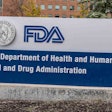
The U.S. Food and Drug Administration (FDA) has issued a safety warning that patients who have received treatment with BCMA- or CD19-directed autologous chimeric antigen receptor (CAR) T-cell immunotherapies may be at higher risk of developing new T-cell malignancies, including CAR-positive lymphoma.
The FDA said that reports of T-cell malignancies were received from clinical trials and/or postmarketing adverse event data sources and have occurred in patients treated with different therapies in the class. The cell therapies listed in the FDA’s warning include the following:
- Abecma (idecabtagene vicleucel) and Breyanzi (lisocabtagene maraleucel) from Bristol Myers Squibb
- Carvykti (ciltacabtagene autoleucel) from Janssen
- Kymriah (tisagenlecleucel) from Novartis
- Tecartus (brexucabtagene autoleucel) and Yescarta (axicabtagene ciloleucel) from Gilead Sciences
The prescribing information for these therapies in the U.S. already warns of the potential risk of developing secondary malignancies. While the FDA stresses that the benefits of these immunotherapies outweigh their potential risks, it said in its warning that it is currently assessing the identified risk of T-cell malignancy to determine whether it will take regulatory action.
In addition, the agency said that patients and clinical trial participants should receive lifelong monitoring for new malignancies. Should a malignancy develop, the agency recommends that patients and healthcare providers contact the FDA and the manufacturer to report the malignancy and get instructions for sample collection for testing for the CAR transgene.














